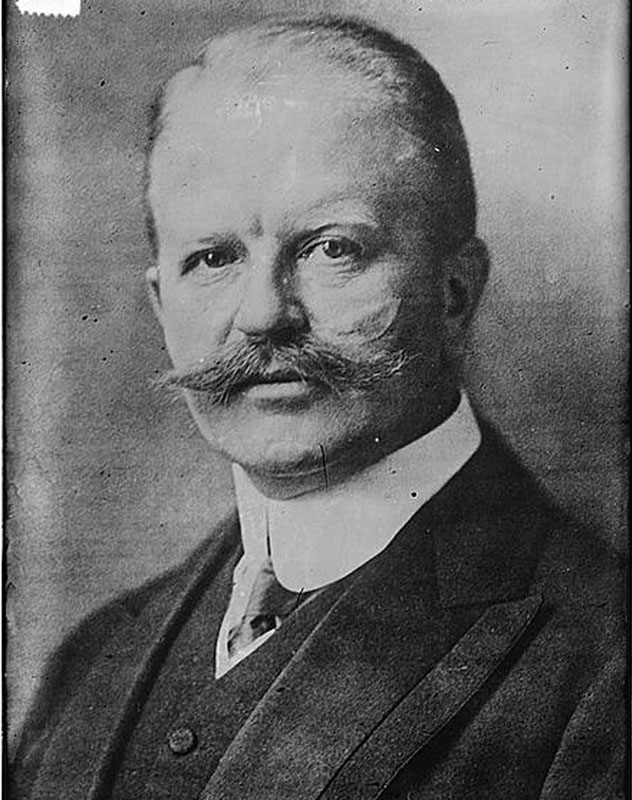Introduction
In January 1917 Germany decided to resume unrestricted submarine warfare, a move certain to antagonize the United States. Hoping to divert America’s attention away from Europe, the German foreign minister, Arthur Zimmermann (1864–1940), proposed a Mexican-Japanese-German alliance to fight the United States. The German government transmitted the “Zimmermann Telegram” to Mexico via Washington, DC, using U.S. diplomatic cables, a courtesy extended to Germany after Britain cut the transatlantic telegraph cables between Germany and the United States. British intelligence agents intercepted and decoded the telegram, and then shared it with Walter Hines Page (1855–1918), the American ambassador to Great Britain. On February 24, 1917, Page transmitted this version to President Wilson (1856–1924) and Secretary of State Robert Lansing (1864–1928). The telegram was made public on March 1, 1917.
The United States and Mexico had clashed repeatedly since 1910 over the direction of the Mexican Revolution, and German secret agents worked diligently to keep the dispute alive. In 1916 the U.S. government sent troops into Mexico to capture the Mexican rebel commander Francisco “Pancho” Villa (1878–1923) in retaliation for a raid on Columbus, New Mexico, that killed eighteen Americans. The invasion, led by Brigadier General John J. Pershing (1860–1948), failed, and U.S. forces had just been withdrawn when the Zimmermann Telegram arrived. Mexican president Venustiano Carranza (1859–1920) considered the proposal but doubted that Germany could fulfill the promises Zimmermann made. To avoid unduly provoking the United States, he officially rejected the proposal on April 14, 1917 (a week after the United States declared war on Germany).
—Jennifer D. Keene
Source: Telegram from Ambassador Walter Page to President Woodrow Wilson Conveying a Translation of the Zimmermann Telegram, February 24, 1917, General Records of the Department of State, Record Group 59, National Archives and Records Administration. Available at https: // www.docsteach.org/documents/document/translation-zimmermann -telegram.
February 24, 8 a.m.
CONFIDENTIAL. FOR THE PRESIDENT
AND THE SECRETARY OF STATE.
Balfour has handed me the text of a cipher telegram from Zimmermann, German Secretary of State for Foreign Affairs, to the German Minister to Mexico, which was sent via Washington and relayed by Bernstorff on January nineteenth.1 You can probably obtain a copy of the text relayed by Bernstorff from the cable office in Washington. … I shall send you by mail a copy of the cipher text and of the de-code into German and meanwhile I give you the English translation as follows:
“We intend to begin on the first of February unrestricted submarine warfare. We shall endeavor in spite of this to keep the United States of America neutral. In the event of this not succeeding, we make Mexico a proposal of alliance on the following basis: make war together, make peace together, generous financial support and an understanding on our part that Mexico is to reconquer the lost territory in Texas, New Mexico, and Arizona. The settlement in detail is left to you. You will inform the President of the above most secretly as soon as the outbreak of war with the United States of America is certain and add the suggestion that he should, on his own initiative, invite Japan to immediate adherence and at the same time mediate between Japan and ourselves. Please call the President’s attention to the fact that the ruthless employment of our submarines now offers the prospect of compelling England in a few months to make peace.” Signed, ZIMMERMANN
The receipt of this information has so greatly exercised the British Government that they have lost no time in communicating it to me to transmit to you, in order that our Government may be able without delay to make such disposition as may be necessary in view of the threatened invasion of our territory.2
The following paragraph is strictly confidential.
Early in the war, the British Government obtained possession of a copy of the German cipher code used in the above message and have made it their business to obtain copies of Bernstorff’s cipher telegrams to Mexico, amongst others, which are sent back to London and deciphered here. This accounts for their being able to decipher this telegram from the German Government to their representative in Mexico and also for the delay from January nineteenth until now in their receiving the information. This system has hitherto been a jealously guarded secret and is only divulged now to you by the British Government in view of the extraordinary circumstances and their friendly feeling towards the United States. They earnestly request that you will keep the source of your information and the British Government’s method of obtaining it profoundly secret but they put no prohibition on the publication of Zimmermann’s telegram itself.
The copies of this and other telegrams were not obtained in Washington but were bought in Mexico.3
I am informed that this information has not yet been given to the Japanese Government but I think it not unlikely that when it reaches them they may make a public statement on it in order to clear up their position regarding the United States and prove their good faith to their allies.



























































































































































































































